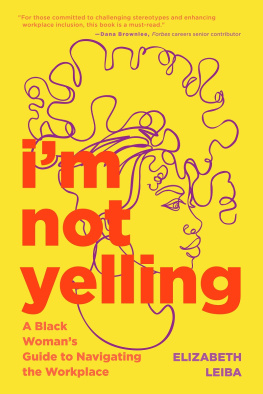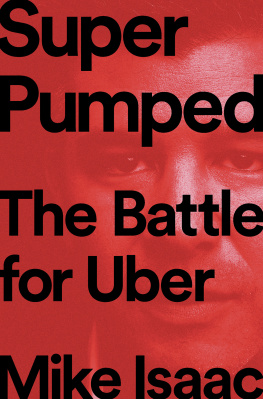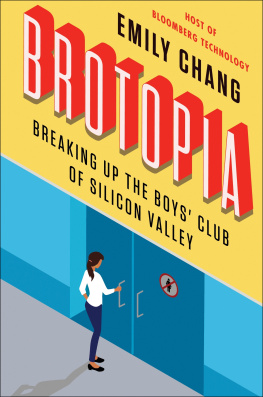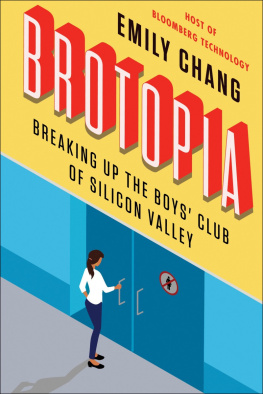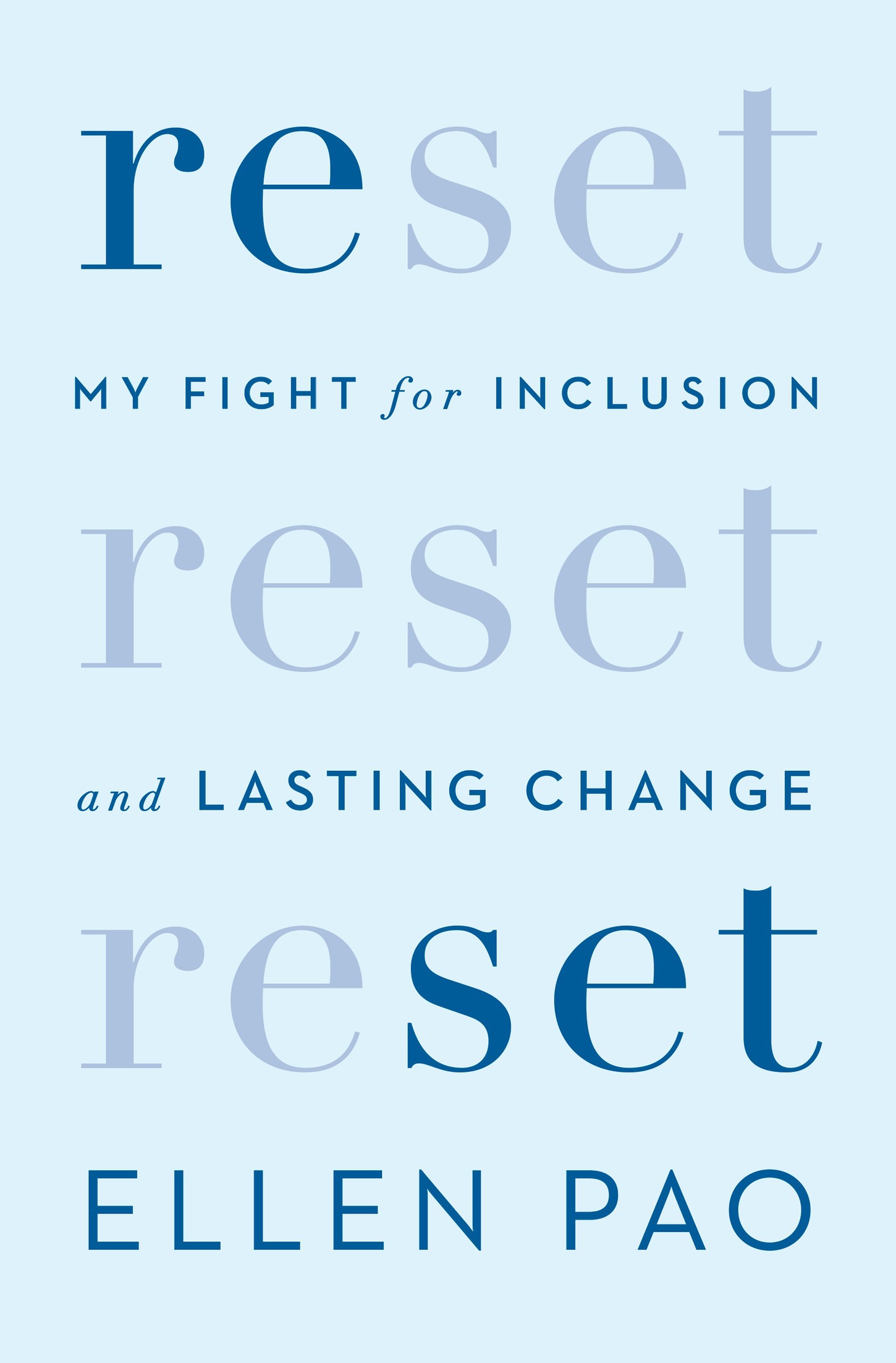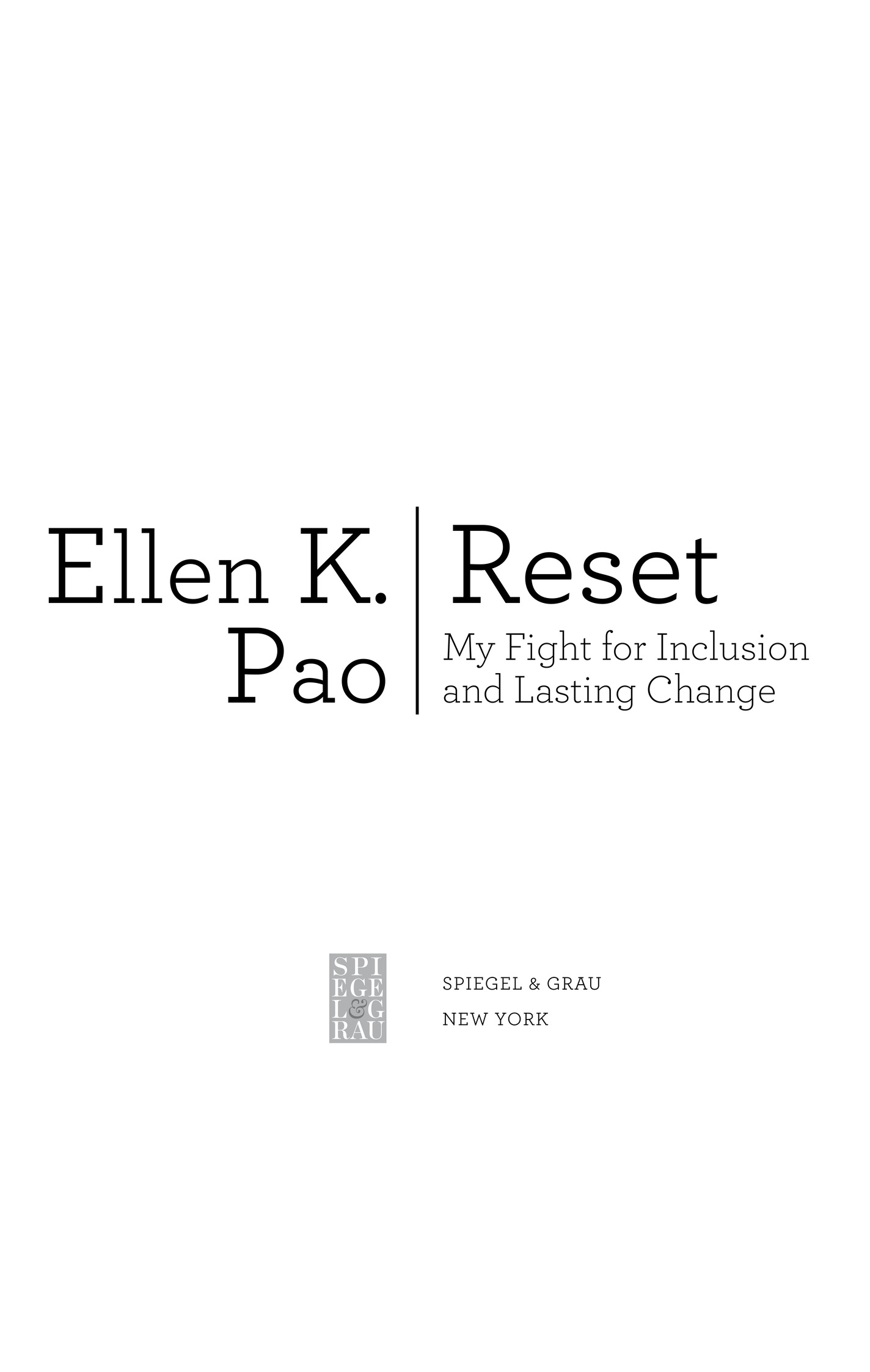Copyright 2017 by Ellen K. Pao
All rights reserved.
Published in the United States by Spiegel & Grau, an imprint of Random House, a division of Penguin Random House LLC, New York.
S PIEGEL & G RAU and Design is a registered trademark of Penguin Random House LLC.
If you are free, you need to free somebody else. If you have some power, then your job is to empower somebody else.
O n the street early one Sunday, a young food deliverer carrying two bags did a double take. Hey! he called out to me. You should have won!
On line for coffee, a middle-aged professional in a button-down and khakis shook his head and said, You put up a good fight.
What was on your mind during that unbelievable trial? an older woman asked me at a dinner party. I tried to read your mind through the TV.
Everyone in our office followed every day of the trial, a tech exec and mother of three told me at our kids soccer practice. We couldnt believe you didnt win. You fought so hard.
Almost every other day, I have a conversation that starts like this. Its usually a really nice experience, and these connections have been the biggest upside to losing a massive lawsuitone that almost ended my career in tech, set me back half a million dollars just in legal fees and costs, and launched a thousand hit pieces on me and on my family. The latter may have been the most brutal consequence of allwe are (or we were) very private people.
People have asked me so many questions over the past couple of years. Ive usually put them off: Its pretty complicated, Ill say, changing the subject. But I do want people to know what happened, so in this book I plan to answer all the questions Ive gotten. Ill share the full story of my discrimination lawsuit against powerhouse tech venture capital firm Kleiner Perkins Caufield & Byersincluding many stories that couldnt be told at the trial and that Ive never shared publicly before now. My experience will bring home, I hope, a lot of what is wrong with the tech world from a diversity and inclusion standpoint. Ill also propose some solutions that I consider reasonable and effective. As painful as a few of my years in Silicon Valley were, and as much as Ive seen women and people of color struggle here, Im optimistic about where the industry is heading. Were at an important juncture for everyone working in technology. Im heartened to see so many CEOs saying that its about time we deal with the elephant in the room: the appalling record on inclusionboth in the tech world and beyond.
In the wake of my lawsuit, many people have told me they finally felt comfortable telling stories they hadnt shared beforeso much so that Ive become a kind of confessor for people who have faced workplace injustices. And not just in tech, but in high-powered industries all over the world. Women and men in accounting, law, advertising, finance, higher education, and more have reached out about being treated unfairly. These stories and messages inspired and encouraged me.
One woman told me at preschool drop-off that when she was an investment banker a decade ago, her boss expected her to help win a deal by sleeping with a client who was hitting on her. She was told to take one for the team. She refused and quit shortly thereafter.
An acquaintance told me that his mother, a woman of color, filed a formal complaint when the university kept stalling her promotion, despite her excellent performanceand in the end, she was pushed out of her job. Another friend, the only woman at her startup, had been written out of her companys foundingand had even been cropped out of early company photos.
One stranger wrote to me during the hardest part of the trial, telling me how, too often, positive comments we receive we deflect like Teflon, while negative comments we hang on to like Velcro. She urged me to do the opposite, to hold the positive moments close to the heart and let the negative incidents slide off. Another woman mailed me a note about her painful experiences in the legal profession, along with a heavy metal paperweight shaped like a gear, engraved with the words Dont let the bastards grind you down in English and Latin.
When the trial ended after five grueling weeks, I was touched to hear that a group of people I didnt even know got together and bought a full-page ad in the Palo Alto Daily Post with two words: Thanks Ellen. A small army of strangers dubbed themselves Team Ellenwith T-shirts to boot. The Guardian published an article with the headline, Thank You Ellen Pao for Teaching More People About Sexism in the Workplace. The hashtag #thankyouEllenPao trended on Twitter. Journalists used the term the Pao effect to refer to the fact that because of my case many women felt more emboldened to speak up about their own experiences of discrimination.
In outlets from MSNBC to the New Republic to Newsweek, thought leaders and pundits compared my case to that of law professor Anita Hillwhose testimony at the 1991 confirmation hearings of Supreme Court justice Clarence Thomas became a landmark moment in history, a moment when sexual harassment and corporate gender equality were finally discussed openly.
Anita Hill herself wrote in Fortune magazine: Hearing the ruminations on Ellen Paos failed gender discrimination suit against her former employer, Kleiner Perkins Caufield & Byers, the famous words of Justice Louis Brandeis come to mind: Sunlight is said to be the best of disinfectants. In Paos case, the sunlight is beginning to do its work.
Powerful advocates came forward from places Id never expected, to share their stories and support; they said they empathized with meand as they told their stories, I saw myself in them, too. Sue Decker, Yahoos former president, had written an op-ed calling the case a watershed moment for women in the workplace, and she reached out and took me to lunch. Sheryl Sandberg, COO of Facebook, said in a Bloomberg TV interview that she saw herself in me, adding, I wrote a whole book about experiences like [hers]. So many womennot just in technology but across industriessaw their own experiences there. One of the most prominent women in D.C. politicsMegan Smith, the chief technology officer of the United Statesvisited the courtroom to offer her support. When asked about the trial, Hillary Clinton said it highlighted the need for men and women to come together to make the tech world a better place for women.
Lena Dunham of Girls asked me to share my experiences and advice with the readers of her newsletter, Lenny. Jessica Chastain, who has built her career playing strong women in film, was one of those readers. It was an incredible essay, she wrote in


